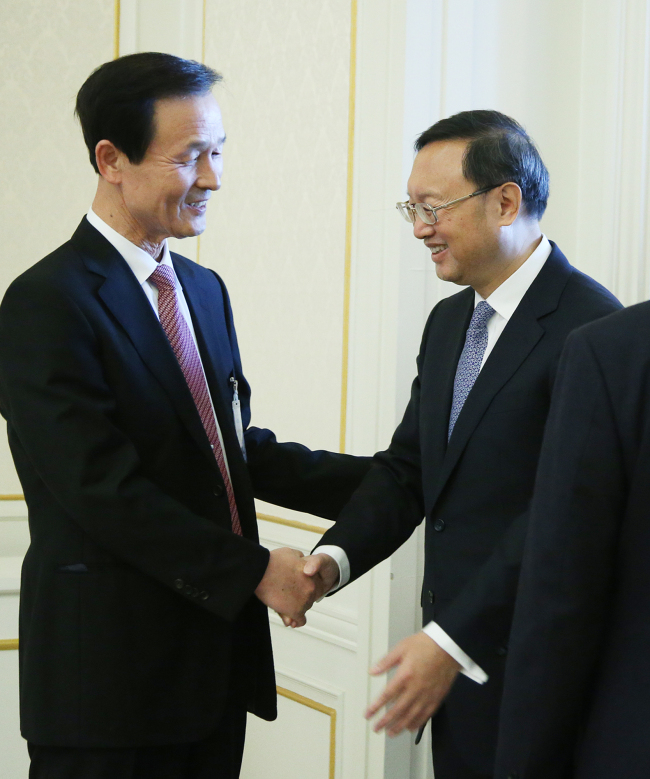Seoul, Beijing hold first strategic security dialogue
By Korea HeraldPublished : Nov. 18, 2013 - 20:04

Top South Korean and Chinese officials in charge of foreign affairs and security held their first strategic talks on Monday on an array of bilateral and regional issues including the North Korean nuclear conundrum.
South Korea’s National Security Office chief Kim Jang-soo and China’s State Councilor Yang Jiechi met at Cheong Wa Dae for the talks designed to enhance bilateral high-level communication on security and diplomacy.
Their meeting was arranged after Presidents Park Geun-hye of South Korea and Xi Jinping of China agreed during their summit in June to institute strategic dialogue between their senior officials.
The Park-Xi agreement came as cooperation on political issues including North Korea’s nuclear adventurism has been lackluster due in part to a lack of mutual trust, despite the two countries’ agreement in 2008 to elevate their ties to a strategic partnership.
Before the talks between Kim and Yang, the Chinese official was greeted by President Park at Cheong Wa Dae.
“I believe your talks with South Korean officials will serve as a good chance to strengthen mutual trust and our friendship,” said Park.
Park also expressed her expectation for Chinese leaders’ promise to reform the economy made during the recent plenary meeting of the 18th Central Committee of the Communist Party.
“(Through the meeting), a blueprint for a reform process was put forward, which bears great significance for Chinese people as well. I hope Chinese dreams, through reform, can quickly be realized.”
Expressing gratitude for Park’s remarks, Yang said the bilateral relationship would enter a new phase of evolvement through shared efforts.
Yang also delivered Xi’s messages to Park, in which he wished to visit Seoul in the near future and hoped that Park would attend the Asia-Pacific Economic Cooperation summit slated to take place in Beijing next year.
Xi also positively evaluated Park’s trust-building diplomacy to promote peace on the peninsula and beyond.
Touching on the ongoing negotiations over a bilateral free trade pact, Yang expressed his expectations that the two countries could speed up the process and conclude a deal that would keep a balance of interests for both sides.
Topping the agenda between Kim and Yang was the resumption of talks with Pyongyang, including the multilateral denuclearization dialogue, which has been stalled since December 2008 amid the North’s provocative acts and breach of international commitments.
Reaffirming their shared stance against the North’s possession of nuclear arms, Kim and Yang agreed to make all diplomatic efforts for “effective progress” toward denuclearization and for peace on the peninsula and in Northeast Asia.
Skepticism over the resumption of the talks, which also involve Russia and Japan, remains in Seoul and Washington as Pyongyang has showed little willingness to abandon its nuclear ambitions.
In a Nov. 11 article in the Rodong Sinmun, the daily of the North’s ruling Workers’ Party, Pyongyang said it would never accept pre-steps for denuclearization demanded by the U.S.
Pyongyang has already declared itself a nuclear power state in its constitution and claimed to have adopted a policy of concurrently pursuing nuclear armament and economic development.
Kim and Yang were also expected to discuss Japan’s push to expand its military reach.
South Korea and China, two major victims of Japan’s past militarism, are particularly concerned about Japan’s moves toward collective self-defense ― the use of force to counter an attack on an ally, namely the U.S.
There are divergent views over Japan’s military buildup. Some argue increased armament could revive Japan’s militaristic past, while others claim that Japan could be encouraged to use its military might for regional and global peace under the constraints of the U.S.-Japan alliance.
By Song Sang-ho (sshluck@heraldcorp.com)
-
Articles by Korea Herald


![[Exclusive] Korean military set to ban iPhones over 'security' concerns](http://res.heraldm.com/phpwas/restmb_idxmake.php?idx=644&simg=/content/image/2024/04/23/20240423050599_0.jpg&u=20240423183955)

![[Graphic News] 77% of young Koreans still financially dependent](http://res.heraldm.com/phpwas/restmb_idxmake.php?idx=644&simg=/content/image/2024/04/22/20240422050762_0.gif&u=)



![[Pressure points] Leggings in public: Fashion statement or social faux pas?](http://res.heraldm.com/phpwas/restmb_idxmake.php?idx=644&simg=/content/image/2024/04/23/20240423050669_0.jpg&u=)










